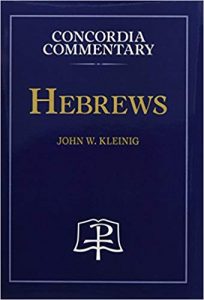John Kleinig is the author of the Hebrews commentary in the Concordia Commentary series. Rev. Dr. Kleinig (Ph.D., Cambridge University) is professor emeritus at Luther College, Adelaide, SA, Australia.

Dr. Kleinig’s dissertation, “The Lord’s song: the basis, function and significance of choral music in Chronicles” (1990) begins with a memorable paragraph in which he acknowledges the inspiration he received from J S Bach.
This shows some of his main concerns as a scholar – his interest in the divine service and the role of church music, both ancient (Psalms, Chronicles) and modern, in the performance of praise, but also his love for Bach and deep respect for the Lutheran Orthodoxy (Calov), which supplied Bach’s inspiration.
Dr. Kleinig’s reputation as a scholar has opened up numerous avenues for him to teach in the USA, Canada, India, South East Asia and South Africa.
This has led to his active involvement as a speaker in Doxology, which is a Lutheran center in the USA for the provision of spiritual care and counsel to pastors. In his retirement, Dr. Kleinig has continued to write extensively, teach in Australia and overseas, translate, and provide care and counsel.
Dr. Kleinig is also the author of the Leviticus volume in the Concordia Commentary series as well as the book Grace Upon Grace: Spirituality for Today. On October 4, 2013 Dr. Kleinig was honored with a Festschrift (i.e. a collection of writings published in honor of a scholar) entitled You My People Shall Be Holy.
It was edited by John R. Stephenson and Thomas M. Winger and published by Concordia Lutheran Theological Seminary, St. Catherines, Ontario, Canada. In 2014 John received an honorary DD from Concordia University.
Which commentary series is best for your purposes? See Best Bible Commentaries: Top 50. Based on aggregate reviews.
7 Questions on Hebrews in the Concordia Commentary Series
Recently, Dr. Kleinig graciously answered my questions about his Hebrews commentary. Readers will learn how this commentary came to be, what is distinct about it among Hebrews commentaries, and how the project edified him personally.
1. What previous research and/or personal interests led you to this project and helped prepare you to write this commentary on Hebrews?
The convergence of four things led to the writing of this commentary – my interest in the theology and practice of worship in both testaments and the church, work for commentary on Leviticus for Concordia with repeated interaction with Hebrews, my passion as an Old Testament scholar for its use in the New Testament, and my conviction about the importance of the ritual enactment of God’s word in worship and in pastoral care.
2. Who is the intended audience for this commentary? Would it benefit pastors? professors? students? lay Christians in the local church?
Its audience is missionaries and pastors in mission churches in the third world as well as pastors and lay leaders in the local church rather than an academic audience of teachers and students.
3. What is unique about this commentary? What contribution does it make to studies of Hebrews?
There is little that is absolutely unique about it. What distinguishes it from many others is its emphasis on Hebrews as a written sermon for a service of worship that explains what is happening in that service and encourages faithful participation in it.
4. What section or passage of this commentary was particularly memorable to research and write? Why?
The section on Hebrews 12:18-29 which provides the congregation and the reader with a radiant vision of access to heaven here on earth in the service of worship through Jesus and his blood.
5. What personally edified you in writing this commentary, increasing your affections for Christ?
As a word of encouragement (Heb 13:22) the letter not only appealed to my imagination with its rhetoric that is addressed to all five sense but also spoke to my conscience with its message of cleansing and pardon, sanctification and empowerment through the blood of Jesus to strengthen my faith, inspire my hope and provoke my love for my fellow saints.
6. Besides your commentary, what are your top recommended books (commentaries or otherwise) on Hebrews?
The best scholarly commentary is by Gareth Lee Cockerill in the NICOT series (2012) while the most reliable and useful popular commentary is by Victor C. Pfitzner in the Abingdon New Testament Commentaries (1997).
7. What is next for you? What project are you currently working on? How can people follow your work and ministry?
I have just completed a book on the Biblical teaching about the human body for Liason Press called “Wonderfully Made. Seeing Our Bodies as God Sees Them” and am translating the “London Writings” of Johann Georg Hamann for Ballast Press. My work can be accessed through the website John W. Kleinig Lutheran Theological Resources at www.johnkleinig.com.
Own John Kleinig’s Hebrews commentary in the Concordia Commentary series
- Get Dr. Kleinig’s Hebrews commentary on Amazon
Recent Posts
David Jeremiah, a renowned pastor, author, and speaker, has captivated the hearts of many with his compelling sermons. His messages resonate deeply with diverse audiences, leaving an enduring...
Tim Keller, a distinguished pastor, theologian, and author, has garnered a devoted following through the profound impact of his sermons. In this article, we will explore seven compelling reasons...
